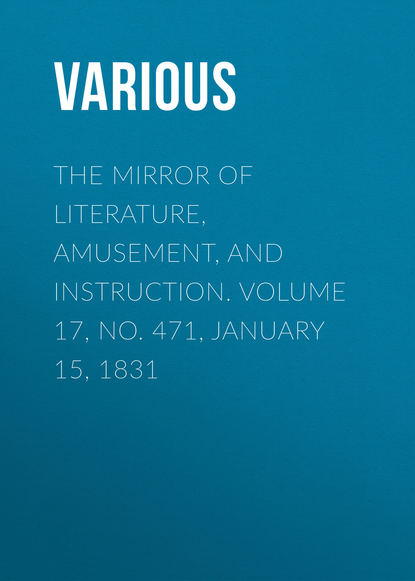По всем вопросам обращайтесь на: info@litportal.ru
(©) 2003-2024.
✖
The Mirror of Literature, Amusement, and Instruction. Volume 17, No. 471, January 15, 1831
Автор
Год написания книги
2018
Настройки чтения
Размер шрифта
Высота строк
Поля
A dyer born, a dyer bred,
Lies numbered here among the dead;
Dyers, like mortals doomed to die,
Alike fit food for worms supply.
Josephus Dyer was his name;
By dyeing he acquired fame;
'Twas in his forty-second year
His neighbours kind did him inter.
Josephus Dyer, his first son,
Doth also lie beneath this stone;
So likewise doth his second boy,
Who was his parents' hope and joy.
His handywork all did admire,
For never was a better dyer.
Both youths were in their fairest prime,
Ripe fruitage of a healthful clime;
But nought can check Death's lawless aim,
Whosoever' life he choose to claim:
It was God's edict from his throne,
"My will shall upon earth be done."
Then did the active mother's skill
The vacancy with credit fill
Till she grew old, and weak, and blind,
And this last wish dwelt on her mind—
That she, when dead, should buried be
With her loved spouse and family.
At last Death's arm her strength defied;
Thus all the dyeing Dyers died!
HALCYON DAYS
Halcyon-days denote a time of peace and tranquillity. The expression takes its rise from a sea-fowl, called among naturalists halcyon, or alcyon, which is said to build its nest about the winter solstice, when the weather is usually observed to be still and calm. Aristotle and Pliny tell us that this bird is most common in the seas of Sicily, that it sat only a few days, and those in the depth of winter, and during that period the mariner might sail in full security; for which reason they were styled Halcyon-days.
P.T.W
USE OF TIME
Dr. Cotton Mather, who was a man of uncommon dispatch and activity in the management of his numerous affairs, and improved every minute of his time, that he might not suffer by silly, impertinent, and tedious visiters, wrote over his study-door, in large letters, "Be short."
Ursinus, a professor in the University of Heidelburgh, and a diligent scholar, to prevent gossips and idlers from interrupting him in his hours of study, wrote over the door of his library the following lines—"Friend, whoever thou art that comest hither, dispatch thy business or begone."
The learned Scaliger placed the following sentence over the doors of his study—"Tempus meum est ager meus," "My time is my field or estate." And it is frequently the only valuable field which the labourer, in body or mind, possesses.
Ever hold time too precious to be spent
With babblers.—Shakspeare.
"Friends," says Lord Bacon, "are robbers of our time."
H.B.A
EPITAPH ON A POTTER
How frail is man—how short life's longest day!
Here lies the worthy Potter, turned to clay!
Whose forming hand, and whose reforming care,
Has left us lull of flaws. Vile earthenware!
H.S.G
LENGTHENING OF THE DAYS
Selden, in his Table Talk, says "The lengthening of days is not suddenly perceived till they are grown a pretty deal longer, because the sun, though it be in a circle, yet it seems for awhile to go in a straight line. For take a segment of a great circle especially, and you shall doubt whether it be straight or no. But when the sun has got past that line, then you presently perceive the days are lengthened. Thus it runs in the winter and summer solstice, which is indeed the true reason of them."
notes
1
"There are not two bricks in your accursed town," said the tragedian, "but are cemented with the blood of an African."
2
Though Lord Byron, like most other persons, in writing to different friends, was some times led to repeat the same circumstances and thoughts, there is, from the ever ready fertility of his mind, much less repetition in his correspondence than in that, perhaps, of any other multifarious letter-writer; and, in the instance before us, where the same facts and reflections are, for the second time, introduced, it is with such new touches, both of thought and expression, as render them, even a second time, interesting; what is wanting in the novelty of the matter being made up by the new aspect given to it.











